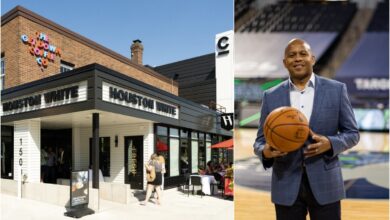‘Black Entrepreneurs Day’ at the Capitol spotlights success and needs of Black businesses

A new era of recognition of the trials and triumphs of Minnesota’s Black small business community began on the morning on Feb. 3 at the State Capitol. The first-ever “Black Entrepreneurs Day” at the Capitol was conceived, convened and presented by business owner, activist, and media personality Sheletta Brundidge.
This unprecedented event brought owners of some 250 Black small businesses to the halls of state government to spotlight their unique needs. “Strong Black businesses are the backbone of our community and are good for everybody,” said Brundidge, founder of the SHElettaMakesMeLaugh podcasting platform. “We led with love and love is contagious. It opens doors.”
Gathered in the rotunda, the state’s most prominent and powerful elected leaders welcomed the Black entrepreneurs and pledged to give them more access to state resources.
“I want this more than anything. I want Black entrepreneurs, professionals, and Black families to view Minnesota as the very best place to live,” said Gov. Tim Walz. “They want to see a set of concrete steps to alleviate the problems, to allow the folks to thrive, create the generational wealth we know we need to create.”
“Black Entrepreneurs Day” arrived as Minnesota has sworn in the most diverse legislature in state history. As that legislature debates the best investments for the $17.6 billion state surplus, there were calls to use funds and policies to strengthen small businesses operated by Black entrepreneurs.
– ADVERTISEMENT –
“These businesses are not just there so entrepreneurs can make money,” said Attorney General Keith Ellison. “People want independence and to fulfill critical community needs. What you see when you are in these businesses is a fulfillment of a dream.”
Joining the governor, lieutenant governor, legislative leaders, lawmakers and other state dignitaries at the podium were several owners of small Black businesses.
Anissa Keyes, whose Arubah Emotional Health employs a staff of 30, took the microphone to demand greater consideration for Black entrepreneurs as decisions and policies are made that will impact them.
“I don’t believe Black business owners need handouts. We need someone to recognize and then adjust their strategic planning and include us so we can get what we need for all of us to be successful,” said Keyes.
After the speeches wrapped up, the Black participants met with individual state senators and representatives to provide them with first-hand insight into their needs. After reaching out to every state lawmaker, Brundidge paired legislators with Black entrepreneurs for one-on-one meetings.
– ADVERTISEMENT –
“We talked to Democrats and Republicans. How do you create change if you don’t engage with people who might think differently than you do? It was a people thing, not a political thing,” Brundidge said. “They all took the time to listen. That is what good government looks like.”
Brundidge said she was heartened that many allies participated behind the scenes to help contribute to the success of the event, from escorting the Black entrepreneurs through the Capitol to backstopping them so they could attend.
“What people didn’t see was the White people who volunteered to work at the Black-owned stores operated by solo-prenuers so they didn’t have to close down and lose a day of sales,” she said. “They were calling me and DM-ing me saying, ‘how can I help?’ I didn’t put a call out; it happened organically. That’s Minnesota nice.”
Going forward
Now that state lawmakers have heard from the Black small business community, Brundidge says she plans to keep the pressure on to work with lobbyists and policymakers to create an agenda centered on strengthening economic opportunities for Black businesses.
– ADVERTISEMENT –
Dr. Artika Tyner, a law professor at the University of St. Thomas, will be working with Brundidge and other Black business owners to streamline their concerns into a list of proposed policies that dedicated lobbyists can use to obtain access to capital.
“This is not a one-size-fits-all; every business needs something different,” noted Brundidge. “Some need financing and capital, some need infrastructure, some need to know how to lobby for themselves.
“They saw us and they heard us. They know we didn’t come to play, to just listen to the governor, clap and go home. We got their attention and now we got to go to work.”
This story was provided in part by SHElettaMakesMeLaugh podcasting. For more info, visit SHElettaMakesMeLaugh.com.
– ADVERTISEMENT –
Support Black local news
Help amplify Black voices by donating to the MSR. Your contribution enables critical coverage of issues affecting the community and empowers authentic storytelling.
























































